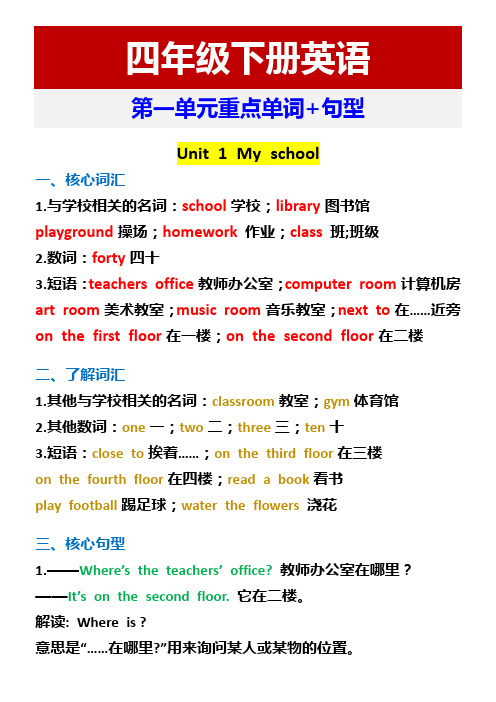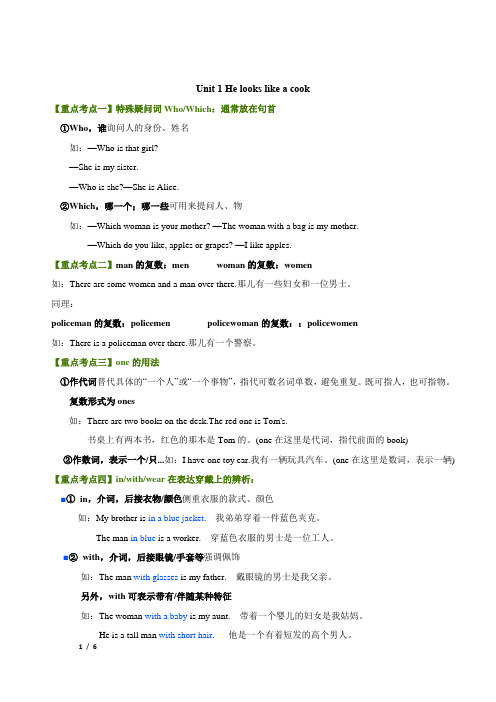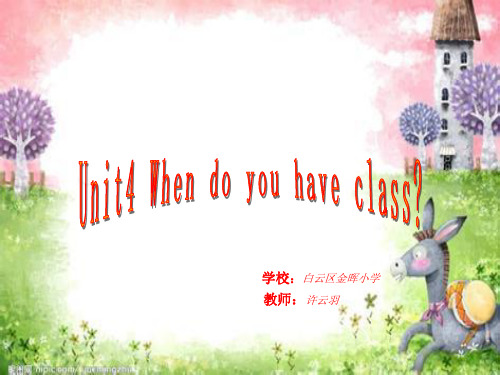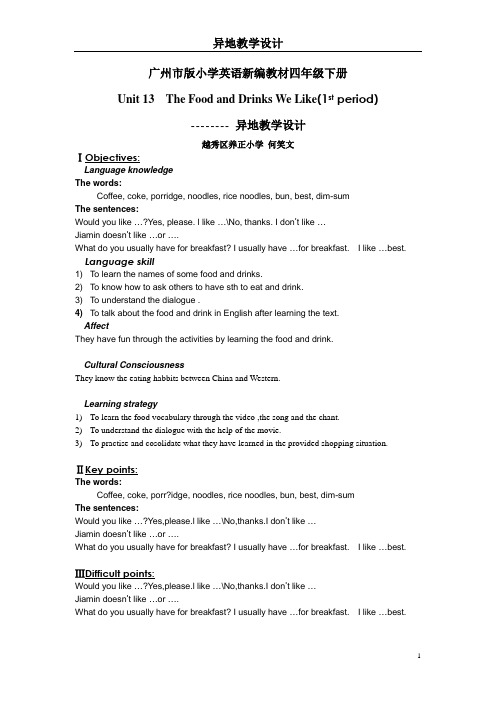广州版小学英语四年级下册每单元重点
小学四年级下册英语第一单元重点单词+句型

第一单元重点单词+句型Unit1My school一、核心词汇1.与学校相关的名词:school学校;library图书馆playground操场;homework作业;class班;班级2.数词:forty四十3.短语:teachers office教师办公室;computer room计算机房art room美术教室;music room音乐教室;next to在……近旁on the first floor在一楼;on the second floor在二楼二、了解词汇1.其他与学校相关的名词:classroom教室;gym体育馆2.其他数词:one一;two二;three三;ten十3.短语:close to挨着……;on the third floor在三楼on the fourth floor在四楼;read a book看书play football踢足球;water the flowers浇花三、核心句型1.——Where’s the teachers’office?教师办公室在哪里?——It’s on the second floor. 它在二楼。
解读:Where is ?意思是“……在哪里?”用来询问某人或某物的位置。
第一单元重点单词+句型举一反三:——Where is your classroom? 你们的教室在哪里?——It’s on the first floor. 它在一楼。
2.——Is that the computer room?那是计算机房吗?——No,it isn’t.It’s the teachers’office. 不,不是。
它是教师办公室。
解读:“Is that…?是向他人确认某物或某地是不是某事物或某地的常见句型。
肯定回答用“Yes,it is.”,否定回答用“No,it isnt.”。
举一反三:——It this your art room?这是你们的美术教室吗?——Yes,it is. 是的,它是。
四年级下册英语各单元知识点

四年级下册英语各单元知识点以下是四年级下册英语各单元知识点:
Unit 1:我的学校
1. 掌握学校设施的词汇:教室、图书馆、操场、食堂等。
2. 学习表达时间和地点的常用句型。
3. 了解学校日常活动和课程安排。
Unit 2:我的家庭
1. 掌握家庭成员的词汇:爸爸、妈妈、兄弟、姐妹等。
2. 学习介绍家庭成员和职业的句型。
3. 了解家庭生活习惯和文化。
Unit 3:在农场
1. 掌握农场动物的词汇:牛、猪、鸡、鸭等。
2. 学习描述农场动物和农作物的句型。
3. 了解农场生活和农业知识。
Unit 4:天气
1. 掌握描述天气的词汇:晴天、雨天、雪天、多云等。
2. 学习表达温度和天气的常用句型。
3. 了解不同地区和季节的天气特点。
Unit 5:节日
1. 掌握常见节日的词汇:春节、中秋节、端午节、圣诞节等。
2. 学习描述节日活动和习俗的句型。
3. 了解不同国家和地区的节日文化。
Unit 6:购物
1. 掌握常见商品的词汇:衣服、鞋子、玩具、文具等。
2. 学习购物时常用的句型。
3. 了解购物习惯和消费文化。
Unit 7:数字与时间
1. 掌握数字0-100的英文表达方式。
2. 学习时间的基本表达方式,包括小时、分钟等。
3. 了解时间在生活中的运用,如日常作息时间等。
(部编)统编版四年级英语下册第一单元知识小结

(部编)统编版四年级英语下册第一单元知
识小结
本单元的研究内容主要包括以下几个方面:
一、重点短语
研究园地、北极熊、国庆节、中秋节、地球、世界、旅游车、动物园、照相机、冰淇淋、回家
二、语法要点
1. 现在进行时:
am/is/are + doing
如:I am playing football.
2. 物主代词:
my、your、his、her、its、our、their
如:This is my book.
3. 一般疑问句:
用动词的原形在句首 + 主语
如:Are you running?
4. 选择疑问句:
用疑问代词在句首 + be/am/is/are + 主语 + 动词原形如:What are you doing?
三、听力技巧
1. 注意听力语境,理解对话全貌。
2. 重点听取关键词。
3. 注意听取时间、地点、人物等信息。
4. 如果听不懂,可以请老师或同学帮忙。
四、研究策略
1. 多听、多读、多说、多写。
2. 培养良好的研究惯,经常复课堂内容。
3. 积极参与课堂讨论和活动,提高口语表达能力。
4. 利用多媒体工具和网络资源加强研究效果。
通过学习,我们不仅能掌握相关的语言表达技巧,还能了解到
丰富的知识和文化内涵。
希望同学们能够在学习中获得快乐和进步!。
四年级下册广州版英语知识点

四年级下册广州版英语知识点
四年级下册广州版英语教材中包含了许多重要的知识点,让我们一起来了解一下吧!
1. 数字和计数:
在这一学期,四年级学生将学习更大的数字,并学习如何进行计数。
他们将学会念数字,并学习如何用英语来表达不同的数量。
同时,他们还将学习如何用英语来进行简单的加减法。
2. 常见动物和植物:
四年级学生将学习许多常见的动物和植物的英文名称。
他们将学习如何用英语来描述这些动物和植物的外貌和特征,并学习如何用英语来询问关于动物和植物的问题。
3. 问路和交通工具:
四年级学生将学习如何用英语来问路和描述不同的交通工具。
他们将学习如何用英语来指示方向,并学习如何用英语来描述不同的交通工具的用途和特点。
4. 介绍自己和他人:
在这个学期,四年级学生将学习如何用英语来介绍自己和他人。
他们将学习如何用英语来描述自己和他人的外貌和性格,并学习如何用英语来询问他人的个人信息。
5. 时间和日期:
四年级学生将学习如何用英语来表达时间和日期。
他们将学习如何用英语来问询时间和日期,并学习如何用英语来描述不同的时间和日期。
6. 季节和天气:
四年级学生将学习如何用英语来表达不同的季节和天气。
他们将学习如何用英语来描述不同季节的特点和不同天气的情况,并学习如何用英语来询问天气情况。
以上是四年级下册广州版英语教材的一些重要知识点。
通过学习这些知识点,学生将能够更好地理解和运用英语,并提升他们的英语交流能力。
希望这些知识点对学生们的学习有所帮助!。
广州版科教版小学英语四年级下册Unit 1 He looks like a cook

Unit 1 He looks like a cook【重点考点一】特殊疑问词Who/Which:通常放在句首①Who,谁询问人的身份、姓名如:—Who is that girl?—She is my sister.—Who is she?—She is Alice.②Which,哪一个;哪一些可用来提问人、物如:—Which woman is your mother? —The woman with a bag is my mother.—Which do you like, apples or grapes? —I like apples.【重点考点二】man的复数:men woman的复数:women如:There are some women and a man over there.那儿有一些妇女和一位男士。
同理:policeman的复数:policemen policewoman的复数::policewomen如:There is a policeman over there.那儿有一个警察。
【重点考点三】one的用法①作代词替代具体的“一个人”或“一个事物”,指代可数名词单数,避免重复。
既可指人,也可指物。
复数形式为ones如:There are two books on the desk.The red one is Tom's.书桌上有两本书,红色的那本是Tom的。
(one在这里是代词,指代前面的book)②作数词,表示一个/只...如:I have one toy car.我有一辆玩具汽车。
(one在这里是数词,表示一辆) 【重点考点四】in/with/wear在表达穿戴上的辨析:■①in,介词,后接衣物/颜色侧重衣服的款式、颜色如:My brother is in a blue jacket. 我弟弟穿着一件蓝色夹克。
The man in blue is a worker. 穿蓝色衣服的男士是一位工人。
广州版小学四年级下册Unit4 when do you have class

Unit4 When do you have class?重点短语have breakfast/ lunch/ dinner 吃早餐、午餐、晚餐$我在早上8点钟吃早餐have classes 上课$你什么时候上课?take exercise 做运动$我们在早上7点30做运动go running 去跑步$我们去跑步吧go swimming 去游泳$我们经常在晚上9点钟去游泳do one’s homework 做作业$我正在做我的作业watch TV 看电视$我妈妈喜欢看电视on weekdays 在平日$在平日,我们去上学play with my dog 与我的小狗玩$在晚上7点45分,我经常跟我的小狗玩儿read story books 读故事书$我的爸爸正在读故事书go to bed 去睡觉$我经常晚上11点睡觉wake up 叫醒$我的妈妈在早上7点钟把我叫醒from…to 从……到$我们的课是从早上9点到下午4点重点句型1. What time do you/ they usually + 动词原形?你、你们是几点钟…..?At + 时间。
2. When do you / they usually + 动词原形?你、你们是几点钟…..?At + 时间。
3.---What time is it?现在几点钟了--It’s +时间。
句型练习根据中文提示把句子补充完整。
1. time you usually have ? (你通常几点吃早餐)2. I breakfast 7o’clock in the . (我通常早上7点吃早餐)3. do have ? (你什么时候上课呢)4. I have class 8 o’clock in the morning 4:30 in the afternoon.(我们从早上8点到下午4点半有课。
)5. --you ( take) exercise ? (你进行体育锻炼吗)-- I usually go (run) or (swim) the afternoon from 4:30 to 5:30.我通常在下午4点半到5点半跑步或者游泳四、知识考点【知识考点一】from....to.... 从......到......from....to..... 可指时间、地点、数字的“从...到...”Beijing Shanghai10:00 11:00 in the morning1 take exercise 进行体育锻炼do exercise = take exerciseHe every day.=He exercise every day.跟take有关的短语take pictures: 拍照take off: 起飞,脱衣服take care of: 照顾【知识考点三】go running: 去跑步It’s time ________ __________ running. 到去跑步的时间了。
版广州小学英语四年级上下册知识点及练习

广州版小学英四年一.填空。
()1.___________youwanttobeacook?A.Does B.Are C.Do()2.Lookatthemen.Theyare_____________.A.policemens B.policemanC.policemen()3.Iwant____________amanagerwhenIgrowup.A.toamB.be C.tobe()4.What‘sjob?She’s_____athlete.A.she⋯anB.her⋯anC.her⋯a()5.What____yourmother____?Sheisaworker.A.d oes⋯doB.is⋯.jobC.does⋯job()6.____yourname?A.WhatB.What’sC.Are()7.____istheteacherinyourfamily?Mybrother.A.WhoseB.He C.Who()8.____sisterisanurse.A.SheB.HerC.She’s()9.BothBenandI_______.A.isfiremanB.arefiremen C.isfiremen()’sJean’sfather’He’?sJohn.A.name B.job C.do二、最正确答案。
1.Can____helpyou?A.IB.meC.my2 .’dlike____buythatcoat.A.onB.forC.to3 .____istheskirt?It’sninetyyuanA.How.many B.HowmuchC.What4.Thisbookisnice.I’lltake A..thisB.they C.i t5.Thereis____inmybedroom.A.ashortsB.apairshortsC.a pairofshorts6.Thesesocksaretwo_____yuan. A.hundred B.ahundred C.hundreds7.Thisjeansis____yuan.A.ninetyt hreeB.ninety-threeC.ninty-three8. Twentyandtwelveis______. A.thirtyB.thirteenC.thirty-two9. ____andsixteenissixty-six.A.Fift eenB.F iftyC.Six ty10.Thirtyand___isseventy-two.A.Fourteen B.FortyC.Forty-two11.Arethe________twentypounds?B.shirt pairofsocks12. ----______T-shirtisthis?-----It ’sBen’s.’s13.Youmeantheman___________ablackhat?B.and14.Sheis__________awhitedress.B.wearing15.TenandTen_______twenty.B.are三、括号内所名的适合形式填空1.Isthis_________(apple)? —No,itisn’t.—Whatarethese?—Theyare______(orange).Passme________(pencil).Givemesome_________(egg),please. 5.—Arethoseyour________(shoe)? —Yes,theyare. 6.Thoseshoesare_________(Tom)..This_________(T-shirt)isbig.四.选择适合的单词填空。
四年级下册英语书课堂笔记

四年级下册英语书课堂笔记以下是四年级下册英语书课堂笔记的示例,供您参考:Unit 1: My school1. 重点单词:playground(操场)library(图书馆)canteen(食堂)office(办公室)classroom(教室)2. 重点句子:This is my school. 这是我的学校。
We have a big playground. 我们有一个大的操场。
The library is on the first floor. 图书馆在一楼。
The office is next to the library. 办公室在图书馆旁边。
My classroom is on the second floor. 我的教室在二楼。
3. 重点语法:用this和that介绍物品和地点。
用on、next to等介词描述物品和地点的位置关系。
Unit 2: My favourite season1. 重点单词:spring(春天)summer(夏天)autumn(秋天)winter(冬天)2. 重点句子:My favourite season is spring. 我最喜欢的季节是春天。
It's warm in spring. 春天很暖和。
I can swim in summer. 我可以在夏天游泳。
It's hot in summer. 夏天很热。
I can wear my coat in winter. 我可以在冬天穿我的外套。
It's cold in winter. 冬天很冷。
3. 重点语法:用I can描述个人能力或喜好。
用it描述天气状况。
小学英语广州版四年级下第四单元

watch TV When do usually watch TV ? I usually watch TV from 4:30 to 5:30.
观察下列句子,找找有什么不同?
When do you usually get up? I get up at 6:15. When does he get up? He usually gets up at 6:15.
I have classes from 8:00 to 4:30.
12:00-1:30
have lunch When do usually have lunch ?
I usually have lunch from 12:00 to 1:30.
4:30-5:30
take exercise
When do usually take exercise?
am
What time is it? It’s 8 o’clock.
It’s time _____ for class.
pm
What time is it?
It’s 7 o’clock.
to my homework. It’s time _____do
pm
What time is it?
It’s 4 o’clock.
It’s time _____ to go back home.
am
11:45
What time is it?
It’s a quarter to twelve.
for lunch. It’s time _____
pm
What time is it?
It’s half past six .
for _____ It’s time dinner.
四年级下册英语 知识点

四年级下册英语知识点四年级下册英语教材主要包括以下几个单元:Unit 1: Let's Move! Unit 2: Pets Unit 3: A Fun Day! Unit 4: Our World Unit 5: Food Unit 6: My Family Unit 7: Five Senses Unit 8: Weather Unit 9: On the Farm Unit 10: Our Clothes Unit 11: Homes Unit 12: Jump for Joy!以下是各个单元的相关知识点参考内容:Unit 1: Let's Move!- 动词动作:run, walk, jump, skip, hop, swim, climb- 指示代词:this, that, these, those- 疑问词:what, where, when, who, why, how- 指示物体位置:behind, in front of, next to, between- 介词:in, on, under, behind, in front of, next to, betweenUnit 2: Pets- 动物名称:cat, dog, bird, fish, rabbit, hamster- 形容词描述:small, big, cute, furry, friendly- 询问及回答问题:Do you have any pets? Yes, I have a ______. No, I don't have any pets.- 宠物习性:eat, sleep, play, drinkUnit 3: A Fun Day!- 活动名称:ride a bike, play soccer, fly a kite, have a picnic, make a cake- 句型:I can ______. Let's _______.- 时间表达:morning, afternoon, evening- 情态动词can:表示能力或允许- 数词:first, second, third, fourth, fifthUnit 4: Our World- 地点名称:school, park, hospital, supermarket, library- 地点描述:big, small, busy, quiet, crowded- 询问及回答问题:Where do you go to play? I go to the__________.- 介词:at, to, in, on- 句型:I go to the ________ to _______.Unit 5: Food- 食物名称:apple, banana, rice, noodles, cake, cookies- 不可数名词:water, milk, juice, bread, butter, cheese- 形容词描述:sweet, sour, delicious, yummy, healthy- 询问及回答问题:Do you like ________? Yes, I do. No, I don't. - 句型:I like _________. I don't like _________.Unit 6: My Family- 家庭成员:grandpa, grandma, dad, mom, brother, sister- 人称代词:I, you, he, she, we, they- 外貌特征:tall, short, old, young, long hair, short hair- 家人关系:father - son, mother - daughter, grandfather - granddaughter- 句型:This is my _______. He/She is _______.Unit 7: Five Senses- 五官名称:eyes, ears, nose, mouth, hands- 动词动作:see, hear, smell, taste, touch- 形容词描述:big, small, loud, quiet, sweet, sour- 句型:I can ______ with my _______.Unit 8: Weather- 天气状况:sunny, windy, rainy, cloudy, snowy- 询问及回答问题:What's the weather like today? It's ________. - 季节名称:spring, summer, autumn, winter- 句型:It's _______ in _______.Unit 9: On the Farm- 牲畜名称:cow, sheep, pig, horse, chicken, duck- 动物生活环境:barn, pen, field- 动物行为:eat grass, run, swim, fly, lay eggs- 询问及回答问题:What can a _______ do? A ________ can_______.- 句型:Look at the _______ in the ________.Unit 10: Our Clothes- 衣物名称:hat, shirt, skirt, pants, shoes, socks- 颜色描述:red, blue, yellow, green, black, white- 季节穿着:coat, sweater, boots, sandals, sunglasses, raincoat- 询问及回答问题:What are you wearing today? I'm wearing a ________.- 句型:I like to wear ________.Unit 11: Homes- 房屋类型:house, apartment, villa, cabin, tent- 我的房间描述:big, small, tidy, messy, comfortable, cozy- 家具名称:bed, desk, chair, table, wardrobe, bookshelf- 询问及回答问题:What is in your room? There is a ________. - 句型:My house has ________.Unit 12: Jump for Joy!- 动词动作:jump, dance, sing, clap, hop, skip- 形容词描述:happy, sad, excited, tired- 表示情感:I am ________. It makes me ________.- 句型:I feel _______ when I _______.希望以上内容能够帮到你!。
四年级下册英语笔记

四年级下册英语笔记一、重点单词1. family 家庭2. friend 朋友3. school 学校4. library 图书馆5. post office 邮局6. hospital 医院7. police station 警察局8. science museum 科学博物馆9. cinema 电影院10. train station 火车站二、重点短语1. meet at the school gate 在校门口集合2. take the train 乘火车3. get to the train station 到达火车站4. on the way to the library 在去图书馆的路上5. post a letter 寄信6. buy some books 买书7. go to the cinema 看电影8. see a film 看电影9. go to the hospital 去医院10. be ill 生病三、重点句型1. Where do you live? 你住在哪里?I live in + 地点。
我住在+地点。
2. How do you get to + 地点?你怎么到达+地点?I get to + 地点 + by + 交通方式。
我通过+交通方式+到达+地点。
3. What do you do at the weekend?你周末做什么?I often + 动词。
我经常+动词。
偶尔会+动词。
有时+动词。
4. What are you going to do this weekend?你这个周末打算做什么?I’m going to + 动词。
我打算+动词。
(完整版)新广州版小学英语四年级下册课文(参考)

(完整版)新广州版小学英语四年级下册课文新广州版小学英语四年级下册课文Unit 1He looks like a cook① Who’s that woman?② Which women?③ The one with glass. She has a big beside her.④ She’s Miss Liu, our teacher .⑤ And that man in a white hat? Can you see him?⑥ Yes. But I don’t know him. He looks like a cook. Unit 2She is very kind① The new English teacher is in the teachers’room.② Really? What is she like?③ She has green eyes and a small mouth.④ And she is very you ng and shy.⑤ She is very kind.Unit 3 It’s time to get up① Mum, what time is it ?② It’s 7 o’clock. It’s time to get up.③ It’s half past seven now , time to go to school.④ It’s a quarter to ten. It’s time to sleep.⑤ Great. I am so tired.Unit 4When do you have class?① What time do you usually have breakfast?②Well, on school days I usually have breakfast at 7 o’clock in the morning.③ I see. And when do you have class?④I have classes from 8 o’clock in the morning to 4:30 in the afternoon.⑤ Hmmm. Do you take exercise?⑥Oh yes. I usually go running or swimming in the afternoon from 4:30 to 5:30.⑦ Thank you very much.Unit 5What day is it today?① What day is it today? Is it Wednesday or Thursday?② It’s Wednesday.It’s my favourite day!③ Why do you li ke Wednesday?④ On Wednesday we have two PE lessons. I love sport.⑤I don’t like sport, so I don’t like Wednesday . My favourite day Is Thursday.Unit 6What do you usually do on Sunday?① What do you usually do on Sunday?② I do my homework. And you?③ I always help my parents do housework.④ Like what?⑤ Sometimes I chean my room. Sometimes I clean the kitchen .⑥I never do housework on Sunday. But I often go shopping with my mum and dad.Unit 7What do you when you have free time ?① It’s Sunday and I fee l bored.② Me too. What do you do when you have free time?③ I often do some reading. Look, I’m reading an intersting book.④ I don’t like that. I usually watch cartoons. Shall we watcha cartoon?⑤ Great! Let’s watch the Monkey King.Unit 8What are you doing?① What are you doing? Ben.② I’m taking photos.③ May I have a look at your photos?④ OK. This one is mum. She is running in the garden.⑤Oh. Look at this one. Grandma is reading in the her bedroom. Grandpa is watching TV.⑥ And I have one of you. You are eating in the kitchen! Unit 9It looks fun① What are the children doing in the playground, Ms White?②Some of the children are playing basketball and football, some of them are doing kung fu.③ What are the children doing next to the swimming pool?④ I think they are skating.⑤ It looks fun. I want to go and try it with them.Unit 10 I am very fast① What’s your favourite sport?② I am tall and I have long arms, so I like playing vollyball.③ My favourite sport is running. I am very fast.④ And what do you like doing, Jiamin?⑤ I like the water.⑥ So do you like swimming best?⑦ No, I like taking a bath.Unit 11I was born in January① Look at all the presents, cards and flowers! What’s going on?② We’re having a party for Jiamin’s birthday.③ Great!④ Happy birthday, Jiamin! I was born in January, too. How old are you?⑤ I’m ten.⑥ Let’s pit 10 candles on the birthday cake.Unit 12Christmas is coming① It’s December already. Christmas is coming soon.② What do you like doing for Christmas, Ben?③In my h ome we like having a big family dinner with lots of great food.④ My dad likes dressing up as Father Christmas. What about you, Jimin?⑤ I like making Christmas cards for my friends. Here’s one for you.⑥ Thanks, Jiamin.Vocabulary(单词):Unit 1 He looks like a cooklike 像look like 看起来像...which 哪一(个);哪一些with 有;和...在一起glasses 眼镜her 她(宾格)Miss 老师;姑娘know 懂him 他(宾格)policewoman 女警察policewomen 女警察(复数)uniform 征服Unit 2 She is very kindkind 和气的;慈爱的What is...like?...像啥shy 害羞的round 圆的friendly 友好的Unit 3 It’s tim e to get updaily 日常的;每日routine 固定的程序;常规time 时刻It’s time to/for...是...的时候了up 向上get up 起床o’clock ...点钟half 一半的past 过去的;过去half past.. ....点半quarter 一刻,十五分钟to 差...到.....(点钟)a quarter to... ....点四十五分(差一刻钟到...点)sleep 睡觉tired 疲倦的lunch 午餐back 回home 家dinner 晚餐Unit 4 When do you have class?usually 通常well 好day 天,日breakfast 早餐at 在from 从from...to.... 从...到.. exercise 练习take exercise 体育锻炼run 跑步go running 去跑步swim 游泳Unit 5 What day is it today?week 周末today 今天Wednesday 星期三Thursday 星期四why 为啥Sunday 星期天Monday 星期一Tuesday 星期二Friday 星期五Saturday 星期六Unit 6 What do you usually do on Sunday?always 总是parent 父(母)亲housework 家务never 从来别often 经常go shopping 去购物park 公园visit 参观film 电影Unit 7 What do you when you have free time ? free 空暇的;自由的feel 感受bored 烦闷的Me too. 我也是do some reading 读点书interesting 有味的cartoon 漫画shall 将要Shall we...? 我们...好吗?king 国王Monkey King猴王take photos 拍照listen to... 听....email 发电子邮件;电子邮件picnic 野餐Unit 8 What are you doing?have a look 看一下fish 钓鱼fly 放(风筝);飞dance 跳舞Unit 9 It looks funfun 有味baskeball 篮球football 脚球kung fu 功夫;武术think 想skate 溜冰try 试;尝试table tennis 兵乓球jump 跳the long jump 跳远hight 高的;高地the high jump 跳高tennis 网球chess (国际)象棋Unit 10 I am very fastarm 手臂velleyball 排球fast 快的;飞速地water 水bath 洗澡take a bath 洗澡clever 聪慧的badminton 羽毛球Unit 11 I was born in January celebration 庆祝January 一月present 礼物card 卡;卡片go on 举行party 聚会was 是(is,am的过去式)candle 蜡烛be born... 生于cake 蛋糕February 二月March 三月April 四月August 八月June 六月November 十一月Unit 12 Christmas is coming Christmas 圣诞节December 十二月already 差不多soon 没多久lot 许多lots of 许多的;大量的dress 穿着as 如;像Father Christmas 圣诞老人July 七月summer 夏天holiday 假日May 五月Mother’s Day 母亲节September 九月Teachers’Day 教师节October 十月Halloween 万圣节spring 春天Spring Festival 春节。
广州小学英语三四年级英语下册 知识技能评价细则 教学大纲 教学思路 广州版小学英语重难点

四年级下册英语水平评价标准1) 关于语音能结合以往学习的元音字母在开、闭音节读音规则读出单词;2) 关于词汇(A)能按“三会”、“四会”的要求,运用于语言综合训练。
(B)词汇的测试形式可以是:* 把下面的词按类别填入表格的适当位置:3) 关于语法(A)能在综合的情景中合理运用以往学习的一般现在时、现在进行时;(B)能在综合的情景中合理运用以往学习的to be, to do 和there be句型。
(C)能在综合的情景中合理运用以往学习的名词、冠词、代词、动词、形容词、副词、数词、介词、连词、感叹词的有关知识。
(D)语法的测试可以是:* ( ) He _______ in the room now.A. watch TVB. watching TVC. is watching TV4) 关于功能(A)能在情景中合理运用以往学习的日常生活用语。
(B)“功能”项目的测试可以是:* 把I项的句子的编号写在II项句子前的括号内:I.A. Happy birthday!B. What’s your favourite sport?C. Would you like some orange juice?II.( ) (1) My favourite sport is running. .( ) (2) Happy birthday!( ) (3) Thanks.5) 关于话题(A)能在情景中合理运用以往学习的话题。
(B)“话题”项目的测试可以是:* 能根据提示(图片、实物)完成句子,或对某话题进行简单的描述(如年龄、生日、爱好等)。
(1) 关于“听”(A)“三会”、“四会”的单词均可用于听力的材料中;(B)以往学习的语言知识可融合到所组织的听力材料中;(C)“听”项目的测试可以是:* 听辩词组或句子;* 根据听的内容选出句子含有的信息;* 听写词汇(限于“四会”单词);* 听句子,把句子的编号写在相应的括号内;* 听短文或对话,做选择题、填空题或是非题。
广州版小学英语四年级下册Module7 Revision 4之一(三年级起) PPT课件

He/she often listens to ….
Sport Star:贝克汉姆
Movie Star :赵薇
What programmes does she often listen to?
She often listens to stories.
What programmes does he often listen to? He often listens to sports news.
Sport Star:贝克汉姆
What programmes does she often listen to?
She often listens to music.
What do you think of the music programmes?
I think music programmes are…
What do you think of plays? What do you think of films? What do you think of cartoons? What do you think of concerts? What do you think of …?
其实,世上最温暖的语言,“ 不是我爱你,而是在一起。” 所以懂得才是最美的相遇!只有彼此以诚相待,彼此尊重, 相互包容,相互懂得,才能走的更远。 相遇是缘,相守是爱。缘是多么的妙不可言,而懂得又是多么的难能可贵。否则就会错过一时,错过一世! 择一人深爱,陪一人到老。一路相扶相持,一路心手相牵,一路笑对风雨。在平凡的世界,不求爱的轰轰烈烈;不求誓 言多么美丽;唯愿简单的相处,真心地付出,平淡地相守,才不负最美的人生;不负善良的自己。 人海茫茫,不求人人都能刻骨铭心,但求对人对己问心无愧,无怨无悔足矣。大千世界,与万千人中遇见,只是相识的 开始,只有彼此真心付出,以心交心,以情换情,相知相惜,才能相伴美好的一生,一路同行。 然而,生活不仅是诗和远方,更要面对现实。如果曾经的拥有,不能天长地久,那么就要学会华丽地转身,学会忘记。 忘记该忘记的人,忘记该忘记的事儿,忘记苦乐年华的悲喜交集。 人有悲欢离合,月有阴晴圆缺。对于离开的人,不必折磨自己脆弱的生命,虚度了美好的朝夕;不必让心灵痛苦不堪, 弄丢了快乐的自己。擦汗眼泪,告诉自己,日子还得继续,谁都不是谁的唯一,相信最美的风景一直在路上。 人生,就是一场修行。你路过我,我忘记你;你有情,他无意。谁都希望在正确的时间遇见对的人,然而事与愿违时, 你越渴望的东西,也许越是无情无义地弃你而去。所以美好的愿望,就会像肥皂泡一样破灭,只能在错误的时间遇到错的人。 岁月匆匆像一阵风,有多少故事留下感动。愿曾经的相遇,无论是锦上添花,还是追悔莫及;无论是青涩年华的懵懂赏 识,还是成长岁月无法躲避的经历……愿曾经的过往,依然如花芬芳四溢,永远无悔岁月赐予的美好相遇。 其实,人生之路的每一段相遇,都是一笔财富,尤其亲情、友情和爱情。在漫长的旅途上,他们都会丰富你的生命,使 你的生命更充实,更真实;丰盈你的内心,使你的内心更慈悲,更善良。所以生活的美好,缘于一颗善良的心,愿我们都能 善待自己和他人。 一路走来,愿相亲相爱的人,相濡以沫,同甘共苦,百年好合。愿有情有意的人,不离不弃,相惜相守,共度人生的每 一个朝夕……直到老得哪也去不了,依然是彼此手心里的宝,感恩一路有你!
广州市版小学英语新编教材四年级下册

广州市版小学英语新编教材四年级下册Unit 13 The Food and Drinks We Like(1st period)-------- 异地教学设计越秀区养正小学何笑文ⅠObjectives:Language knowledgeThe words:Coffee, coke, porridge, noodles, rice noodles, bun, best, dim-sumThe sentences:Would you like …?Yes, please. l like …\No, thanks. I don’t like …Jiamin doesn’t like …or ….What do you usually have for breakfast? I usually have …for breakfast. I like …best. Language skill1) To learn the names of some food and drinks.2) To know how to ask others to have sth to eat and drink.3) To understand the dialogue .4) To talk about the food and drink in English after learning the text.AffectThey have fun through the activities by learning the food and drink.Cultural ConsciousnessThey know the eating habbits between China and Western.Learning strategy1)To learn the food vocabulary through the video ,the song and the chant.2)To understand the dialogue with the help of the movie.3)To practise and cosolidate what they have learned in the provided shopping situation.ⅡKey points:The words:Coffee, coke, porr?idge, noodles, rice noodles, bun, best, dim-sumThe sentences:Would you like …?Yes,please.l like …\No,thanks.I don’t like …Jiamin doesn’t like …or ….What do you usually have for breakfast? I usually have …for breakfast. I like …best.ⅢDifficult points:Would you like …?Yes,please.l like …\No,thanks.I don’t like …Jiamin doesn’t like …or ….What do you usually have for breakfast? I usually have …for breakfast. I like …best.ⅣPreparation:Some pictures , the video and the teaching software.Unit 13 The Food and Drinks We Like(1st period)-------- 异地教学反思养正小学何笑文4月11日,我到清水濠小学进行了一节新授课的异地教学。
版广州版小学英语四年级下册U8教案

一、课前小测知道他(宾格)女警察(单数).女警察(复数)好(副词)好(形容词).好(副词)早饭在(几点钟).老是电影风趣的.听发电子邮件 /电子邮件野餐.礼拜天礼拜一礼拜二.礼拜三礼拜四礼拜五 /礼拜六. 三、 Unit 8单词看一下垂钓放(风筝);飞跳舞四、 Unit 8词组摄影.看一看.在她的寝室.在厨房the.在湖里游泳in the.在操场上the.看动画片cartoons.五、 Unit 8句型依据中文提示把句子增补完好。
1.are you?(你在做什么? )2.taking.(我在摄影片 )3.I have a look your photos?(我能看看你的照片吗?).4.She the garden.(她在花园里跑步。
)5.is in her bedroom. ( 奶奶在寝室里念书。
)6.Grandpa watching TV.(爷爷在看电视。
)7. You in the kitchen!(你在厨房里吃东西 )六、知识考点【知识考点一】have a look:看一下have a look =take a look我能够看一下你的图片吗?May I your pictures?May I your pictures?look, watch, see的划分:look:重申看的动作,能够独自使用;也能够在后边加at 表示“看的内容”。
! It is a fish!the blackboard.see: 重申看的结果,重申看得见看不见。
不可以独自使用。
I can a bird. a film = a moviewatch: 重申看的过程,常用在看电视、看竞赛。
TV football game cartoons.【知识考点二】fish: 1) 垂钓(动词)2)鱼(名词)My father is in the park.How many do you like?【知识考点三】fly: 飞;放飞Can you (fly/ flies) in the sky?放风筝: fly a kite 或许 fly kites.The girls kites in the playground.【知识考点四】dance: 1)舞蹈;跳舞(动词)2)表示“某类舞蹈”(名词)My sister is in the living room.Lion 舞狮folk 民族舞【知识考点五】此刻进行时复习 (定义、动词 ing 形式,时间重点词,句型和互相转变)tell play fly get .put take write .【知识考点六】May I ? 用于提出恳求use your computer?come in?【知识考点七】And I have one of you.我还有一张你的(照片)。
小学四年级下册英语:1、2单元重点句型

12Unit 1 Welcome to my new home!【句型】1.Welcome to my new home.欢迎来到我的新家。
2.Look at my bedroom.看看我的卧室。
3.There is a new bed.有一张新床。
4.And there's a new desk and a new chair.还有一套新桌椅。
5.There are two sofas and four armchairs.有两个沙发和四个手扶椅。
6.Look!Here's a new table.看!有一个新桌子。
7.Look!What's in my study?There is a new computer. 看!我书房有什么?哇!有一台新电脑。
8.This is the living room.这是客厅。
9.That's the bathroom.那是浴室。
12Unit 2 There are forty students in our class. 【句型】1.Good afternoon,boys and girls!下午好,男孩女孩们!2.—How many students are there in your class?你们班有多少学生?—Twenty-nine.二十九个。
3.Let's count from 1 to 29!让我们从1数到29。
4.Welcome to our class!欢迎来我们班。
5.—How many teachers are there in your school?你们班有多少个老师。
—There are fifty.五十名。
6.—How about your school?你们学校呢?—There are sixty teachers in our school.我们学校有六十名老师。
7.—How many bags do you have?你有多少书包?—We have seventy bags.我们有七十个书包。
- 1、下载文档前请自行甄别文档内容的完整性,平台不提供额外的编辑、内容补充、找答案等附加服务。
- 2、"仅部分预览"的文档,不可在线预览部分如存在完整性等问题,可反馈申请退款(可完整预览的文档不适用该条件!)。
- 3、如文档侵犯您的权益,请联系客服反馈,我们会尽快为您处理(人工客服工作时间:9:00-18:30)。
他在听音乐吗?
B:Yes,he is.
是的。
6.
A:Is the man/ boy playing with the dog?
这个男人/男孩在和狗玩耍吗?
B:Yes,he is.
是的。
7.
A: Is she listening to the MP3?
是的,我在玩。
4.
A: Are you dancing?
你在跳舞吗?
B: No, I’m not.
不,我没有跳舞。
Unit 7 School Sports Day
一、单词双基
★dance
跳舞
sea
海
★model
模型
★lake
湖
★fun
乐趣
★have fun
玩得开心
★out there
外面那个地方
★enjoy
下棋
7.
watch TV
看电视
8.
read a story-book
看故事书
9.
listen to the music
听音乐
三、句型导学
1.
A:What is he doing?
他在做什么?
B:He is singing.
他在唱歌。
2.
A:What is the man/ boy doing?
这个男人/男孩在做什么?
1.
Happy birthday!
生日快乐!
2.
a brithday card
一张生日贺片
3.
birthday party
生日聚会
4.
give her (him/ you/ me/ them)
给她(他/你/我/他们)
5.
grandpa’s birthday
爷爷的生日
6.
two hundred years old
B:He is eating.
他在吃东西。
3.
A:What is she doing?
她在做什么的?
B:She is fishing.
她在钓鱼。
4.
A:What is the woman/ girl/ lady doing?
这个女人/女孩/女士在做什么?
B:She is playing.
她在玩。
5.
那个妇女多少岁?
B:She is twenty-four years old.
她24岁。
B:Twenty-four.
24岁。
B:24.
24岁。
3.
A:How old is the girl?
那个女孩多少岁?
B:She is fifteen years old.
她15岁。
B:Fifteen.
15岁。
B:15
7.
to tell you the truth
实话告诉你
8.
two hundred
两百
三、句型导学
1.
A:How old is she?
她多少岁?
B:She is twelve years old.
她12岁。
B:Twelve.
12岁。
B:12.
12岁。
2.
A:How old is the woman?
★slowly
慢慢地
★fast
快的
★high
高
★get
得到
★catch
抓住
★catch up
赶上
★fall
落下
★fall over
跌倒
★long jump
跳远
★high jump
跳高
★pupil
学生
★go for it
快点
★team
队
wave
挥动
cross
横过
baton
接力棒
field
运动场地
winner
她在听MP3吗?
B:No,she isn’t.
不,她没有。
8.
A:Is the woman/ girl/ lady painting?
这个女人/女孩/女士在画画吗?
B:No,she isn’t.
不,她没在画画。
Module 3 Sports
Unit 7 School Sports Day
一、单词双基
Unit 11 Radio and Television
一、单词双基
★news
新闻
★CD
光盘
★turn on
打开(电器)
★show
展览
cartoon
卡通
Mickey Mouse
米老鼠
Donald Duck
唐老鸭
二、词组导学
1.
like watching TV
喜欢看电视
2.
sport programme
喜欢
kid
孩子
★instrument
仪器
musical instrument
乐器
musical
音乐的
二、词组导学
1.
have fun
玩得开心
2.
out there
在外边的那个地方
3.
in the sea
在海里
4.
in the lake
在湖里
5.
a model ship
一艘轮船模型
6.
play chess
B:It’s interesting.
很有趣。
4.
A: what do you think of the play?
你觉得那戏剧怎么样?
B:It’s fun.
有趣。
5.
A:What programme do you like?
你喜欢什么节目?
B:I like news programme.
我喜欢新闻节目。
我最喜欢的运动是跑步。
3.
A:Do you have batons?
你有接力棍吗?
B:No,I don’t.
没有。
Unit 8 Sports Stars
一、单词双基
★good
好的
★be good at
善于……
★report
记者
★also
也
★gold
金
★well done
干得好
★Here we come!
5.
cook the dinner
做饭
6.
watch TV
看电视
7.
do homework
做家庭作业
8.
have dinner
吃晚饭
9.
play football
踢足球
10.
play basketball
打篮球
11.
read story-book
读一本故事书
12.
work on the computer
在电脑上工作
三、句型导学
1.
A: What are you doing?
你在做什么?
B: I’m cooking.
我在做饭。
2.
A: What are you doing?
你们在做什么?
B:We’re talking.
我们在聊天。
3.
A: Are you playing?
你在玩吗?
B: Yes, I am.
是的。
2.
A:Are they good at swimming?
他们擅长游泳吗?
B:No,they aren’t.
不。
3.
A:Which sport are you good at?
你擅长哪项体育运动?
B:I am good at playing football.
我擅长踢足球。
4.
A: Do you have gold medals?
9.
fall over
跌倒
三、句型导学
1.
A:What are they doing?
他们在做什么?
B:They are doing the high jump.
他们在跳高。
2.
A:What’s your favorite sport?
你最喜欢的运动是什么?
B:My favorite sport is running.
钓鱼
★radio
无线电
★story-book
故事书
★again
再一次
★ready
准备
guitar
吉他
yet
仍然
still
仍然
二、词组导学
1.
nice music
好听的音乐
2.
listen to the radio
听广播
3.
play the guitar
弹吉他
4.
paint a picture
画一幅画
干得好!
4.
Here we come!
我们来啦!
5.
Chinese women athlete
中国女子运动员
6.
a setter of a wold record
一项世界纪录的创造者
三、句型导学
1.
A:Are they good at doing the long jump?
他们擅长跳远吗?
B:Yes,they are.
200岁
7.
a birthday song
